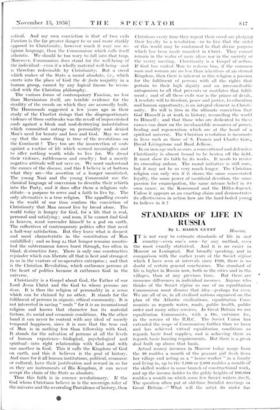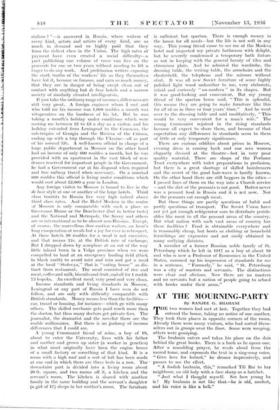STANDARDS OF LIFE IN RUSSIA
By L. HADEN GUEST Moscow.
IT is not easy to estimate standards of life in any country—even one's own—by any method, even the most exactly statistical. And it is no easier in Moscow or Leningrad. But broadly speaking, and in comparison with the earlier years of the Soviet regime which I have seen at intervals since 1920, there is no doubt of certain general conclusions. The standard of life is higher in Russia now, both in the cities and in the villages, than at any previous time. But there are immense differences in individual incomes. Anyone who thinks of the Soviet regime as one of an equalitarian Communism must dismiss that idea—perhaps for ever. We are all of us, in all civilised nations organised on the plan of the Atlantic civilisations, equalitarian Com- munists as regards water, roads, public health, public order and many other services. In Great Britain we are equalitarian Communists, with a 10s. entrance fee, in the service of the B.B.C. The Soviet Union has extended the scope of Communism further than we have and has achieved virtual equalitarian conditions as regards basic food supplies, and is achieving them as regards basic housing requirements. But there is a great deal built up above that basis.
Actual money incomes in Moscow today range from the 40 roubles a month of the peasant girl fresh from her village and acting as a " house-worker " in a family and living in, up to the 1,000 or 2,000 roubles a month of the skilled worker in some branch of constructional work, and up the income ladder to the giddy heights of 100,000 roubles a month on which some few Soviet writers dwell. The question often put at old-time Socialist meetings in Great Britain—" What will the artist do under So-. cialism ? "—is answered in Russia; where writers of every kind, actors and artists of every kind, are so much in demand and so highly paid that they form the richest class in the Union. The high rates of payment have even created a social difficulty,-ra poet publishing one volume of verse can live on the proceeds for one or two years without needing to lift a finger to do any work. And proletarian writers exposing the stark truths of the workers' life as they themselves have led it, become so famous, and earn so much money, that they are in danger of being swept clean out of contact with anything but de luxe hotels and a narrow society of similarly situated intelligentsia.
If you take the ordinary range of incomes, differences are still very great. A foreign engineer whom I met and who told me his income was 1,000 roubles a month was vituperative on the hardness of his lot. But he was taking a month's holiday under conditions which were costing me between £2 to £3 a day as a visitor, and his holiday extended from Leningrad to the Caucasus, the sub-tropics of Georgia and the Riviera of the Crimea, ending up with a trip through the Ukraine—all as part of his normal life. A well-known official in charge of a large public department in Moscow on the other hand had an income of only 600 roubles a month, but he was provided with an apartment in the vast block of resi- dences reserved for important people in the Government, he had a Government car at his disposal when required and free railway travel when necessary. On a nominal 600 roubles this official is living under conditions which would cost about £2,000 a year in London.
Any foreign visitor to Moscow is bound to live in the de luxe style at one or another of the large hotels. Third class tourists to Russia live very high indeed above third class rates. And the Hotel Moskva in the centre of Moscow is only comparable with such a place as Grosvenor House or the Dorchester (but in better taste) and the National and Metropole, the Savoy and others are so international as to be almost non-Russian. Except, of course, the marvellous slow-motion waiters, an hour's long exasperation at meals but a joy for ever in retrospect. At these hotels 30 roubles • for a meal is not excessive. and that means 24s. at the British rate of exchange, But I dropped down by aeroplane at an out of the way little inland town in a Volga province when we were compelled to land at an emergency landing field (thick in black earth) to avoid mist and rain and got a meal at the local "Stolovya," that is "eating house" as dis- tinct from restaurant. The meal consisted of rice and meat, coffee and milk, biscuits and fruit, and all for 1 rouble 75 kopeks. An excellent meal, very good and very clean.
Income standards and living standards in Moscow, Leningrad or any part of Russia I have seen do not follow, and are only with difficulty comparable with British standards. Money means less than the facilities— car, travel or housing, for instance—which go with many offices. The skilled mechanic gets paid much more than the doctor, but then many doctors get private fees. The journalist, the dramatist and the novelist there are the rouble millionaires. But there is no jealousy of income differences that I could see.
A young Communist friend of mine, a boy of. 19, about to enter the University, lives with his father and mother and grown up sister (a worker in genetics) in what must originally have been the engine house of a small factory or something of that kind. It is a room with a high roof and a sort of loft has been made at one end in which there are three beds in a row. The downstairs part is divided into a living room about 20 ft. square, and two rooms off it, a kitchen. and the servant's room. The kitchen • is shared with another family in the same building and the servant's daughter (a girl of 17) sleeps in her mother's room. The furniture is sufficient but spartan. There is enough money in the house for all needs—but the life is not soft in any way. This young friend came to see me at the Moskva hotel and inspected my private bathroom with delight, but he severely condemned a temporary bath fixture as not in keeping with the general luxury of tiles and chromium plate. And he admired the wardrobe, the dressing table, the writing table, the armchairs and the chesterfield, the telephone and the mirrors without stint. It was all new Soviet furniture of some highly polished light wood unfamiliar to me, very elaborate, inlaid and curiously " un-modern " in its shapes. - But it was good-looking and convenient. But my young friend of the spartan home said, " This is splendid, this means they are going to make furniture like this for all of us in three or four years' time." And he went over to the dressing table and said meditatively, " This would be very convenient for a man's wife." The young Communist rejoiced in . the rising standards because all expect to share them, and because of that expectation any differences in standards seem to them of little or only temporary significance.
There are curious oddities about prices in Moscow, evening dress is coming back and one sees women elegantly dressed at the theatre—but in very poor quality material. There are shops of the Perfume Trust everywhere with toilet preparations in profusion, but there is a great shortage of skilled hairdressers and the secret of the good hair-wave is hardly known. On the other hand there are still beggars in the cities— I passed lines of them on the way into a Church service —and the diet of the peasants is not good. Butter never was a peasant food in Russia and it is not now. Nor do the peasants eat enough meat.
But these things . are partly questions of habit and partly questions of transport. The Soviet Union have not yet got enough refrigerator cars to distribute perish- ables like meat to all the peasant areas of the • country. But what nation with such vast areas . of country has these facilities ? Food is obtainable everywhere and is reasonably cheap, but boots or. clothing or household furnishings are expensive and • not easily obtained in many outlying districts.
A member of a former Russian noble family of St. Petersburg which he left in 1917. as a boy of ;about 16 and who is now a Professor of Economics in the United States, summed up his .impression of standards for me in a sentence. " Formerly," he said, " St. Petersburg was a city of masters and servants. The distinctions were clear and obvious. Now there are no masters and no _servants but a nation of people going to school with books under their arms."















































 Previous page
Previous page